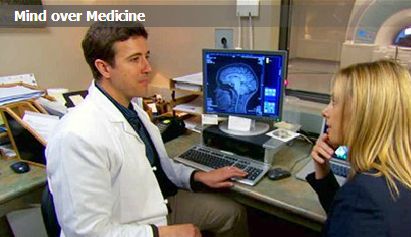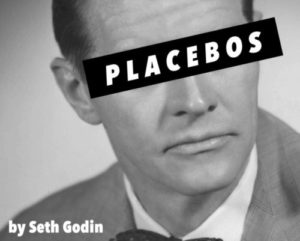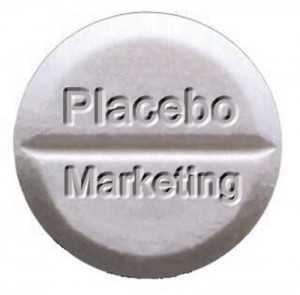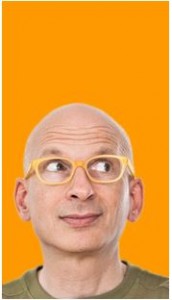Tag Archives: Media
Video – the strange science of the placebo effect
Nature RX: Nature as Placebo
Set in the world of a spoofed prescription drug commercial, Nature Rx offers a hearty dose of laughs and the outdoors – two timeless prescriptions for whatever ails you. Side effects may include confidence, authenticity, remembering you have a body, and being in a good mood for no apparent reason.
More from Seth Godin on placebos and marketing
We’ve published his work here before, but it’s time for some more truisms on the placebo effect from marketing guru Seth Godin, one of the godfathers of ‘viral marketing’ (in Crucial Elements for the placebo effect). Seth’s really into placebos!
….
Placebos, used ethically, are powerful tools. They can cure diseases, make food taste better and dramatically increase the perceived quality of art. They can improve the way teachers teach, students learn and we judge our own safety.
….
They do best when they improve something that is difficult to measure objectively.
….
Argue all you want about whether or not you want to be buying or selling placebos, but it’s quite likely that the right placebo with the right story can dramatically increase certain outcomes.
If you want to improve performance, the right placebo is often the safest and cheapest way to do so. The opportunity is to find one that’s likely to work, and to market it in a way that’s ethical and effective.
….
If you like Seth’s style, he has another blog post on the placebo effect in marketing here (Marketing of the placebo: Everyone gets their own belief) and a whole downloadable essay/course here (Placebos) which contains some keen – and entertaining! – thinking on the placebo effect as it relates to marketing (which to Godin, is critical to more in our lives than we imagine!)
….
Facing a long plane trip with a nasty cold, I headed over to the health food store.
“Excuse me, do you have any placebos? I have a really horrible cold… I’ll take the strongest one you’ve got.”
She looked at me with pity. “A placebo?”
“Yes, please.”
“Do you know which company makes that? I don’t think we have any placebos?”
I waited for a second, thinking hard about what was happening.
“Hey Sylvia,” she yelled, “there’s a guy out here who wants some placebo, but he doesn’t know who makes it. Do we carry that?”
Sylvia didn’t know.
“When effective drugs do exist, placebo effects can enhance their impact.”
More research from Ted Kaptchuk, in the New England Journal of Medicine.
“Placebos don’t necessarily provide cures, but they provide relief. In medical situations in which no cure is available, supportive and attentive health care can help patients to feel better, and when effective drugs do exist, placebo effects can enhance their impact.”
And …
“A significant body of research has resulted in a shift from thinking of placebos as just ‘dummy’ treatments to recognizing that placebo effects encompass numerous aspects of the health care experience and are central to medicine and patient care. Recent scientific advances have enabled us to identify a trove of neurotransmitters and detect relevant neural brain pathways as well as genetic markers that help explain the biology of the placebo effect.”
Placebo marketing by Big Pharma
A scary story in Salon about overt corporate deception in the marketing (even just the *naming*!) of certain drug products – as in the ‘repackaging’ of Prozac by Eli Lilly to exploit new markets. As in other, non-pharmaceutical marketing, cultural expectations play an enormous role.
‘I suggested to Moerman how odd it is that the meanings we ascribe to a pill can sometimes be more powerful than its active substance, especially in the realm of psychopharmacology.
“Well, James, you’re an anthropologist, right? You know the power of meaning! Every culture has its symbols and objects of veneration and it is no different with us. Once, for us, we revered crosses and statues of the Virgin Mary, but now pills and stethoscopes capture our worship. So even an inert pill can affect us because it has shape and form and a context, and it has language attached. It comes in a blue box or a pink box, it’s taken in a pharmacy, doctor’s room, or hospital with all the panoply of a thousand years of medical tradition behind it to give it overwhelming symbolic weight.”‘
The placebo effect in marketing
Online marketing guru Seth Godin talks openly here about the placebo effect and its relation to modern marketing. He says that, “(As marketers) … we don’t like to admit that we tell stories, that we’re in the placebo business. Instead, we tell ourselves about features and benefits as a way to rationalize our desire to to help our customers by allowing them to lie to themselves.
The design of your blog or your package or your outfit is nothing but an affect designed to create the placebo effect. … It’s all storytelling, it’s all lies.
Not that there’s anything wrong with that.
In fact, your marketplace insists on it.”
Harvard’s Kaptchuk at TEDMED 2014
From Stephanie Buam, at Medcity News:
“It would be oversimplified to call it the power of positive thinking, but Harvard Medical School Professor Ted Kaptchuk‘s talk at TEDMED 2014 in Washington D.C., highlighted compelling research surrounding the placebo effect. Kaptchuk focused on applications of the placebo effect for conditions as diverse as migraine headaches to Parkinson’s disease. It demonstrates that some of the power of a drug comes from a patient thinking that it will work.”
There’s an app for that …
‘New research shows that deception may not be necessary for the placebo effect’
There’s an emerging discussion on the efficacy of a placebo *even when the patient knows they’re taking a placebo*, and this is fleshed out interestingly in the discussion of whether a placebo smartphone app would actually work.
Mind over Medicine

More placebos in the media, this time from Australia’s 60 Minutes.
"We have in our minds, in our brains, the capacity to change the way we experience pain, to affect some of the illnesses that bring us in to see physicians. What we need to do is learn how to unlock those capacities and make use of them."






